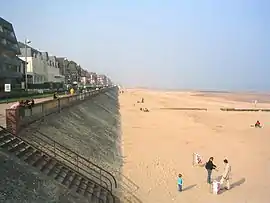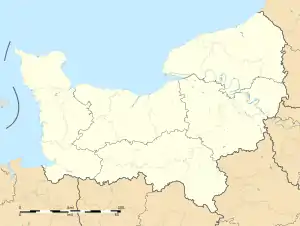Cabourg | |
|---|---|
 Cabourg Beach | |
 Flag .svg.png.webp) Coat of arms | |
Location of Cabourg | |
 Cabourg  Cabourg | |
| Coordinates: 49°17′17″N 0°06′59″W / 49.2879810°N 0.1162920°W | |
| Country | France |
| Region | Normandy |
| Department | Calvados |
| Arrondissement | Lisieux |
| Canton | Cabourg |
| Intercommunality | Normandie-Cabourg-Pays d'Auge |
| Government | |
| • Mayor (2020–2026) | Tristan Duval[1] |
| Area 1 | 5.52 km2 (2.13 sq mi) |
| Population | 3,583 |
| • Density | 650/km2 (1,700/sq mi) |
| Time zone | UTC+01:00 (CET) |
| • Summer (DST) | UTC+02:00 (CEST) |
| INSEE/Postal code | 14117 /14390 |
| Elevation | 0–15 m (0–49 ft) (avg. 5 m or 16 ft) |
| 1 French Land Register data, which excludes lakes, ponds, glaciers > 1 km2 (0.386 sq mi or 247 acres) and river estuaries. | |
Cabourg (French pronunciation: [kabuʁ] ⓘ; Norman: Cabouorg) is a commune in the Calvados department, region of Normandy, France. Cabourg is on the coast of the English Channel, at the mouth of the river Dives. The back country is a plain, favourable to the culture of cereal. The town sits on the Côte Fleurie (Flowery Coast) and its population increases by over 40,000 during the summer .
Geography
Cabourg is located on the north of France between Caen and Deauville, part of the Côte Fleurie. The town is on the Dives river, across from Dives-sur-Mer.
On 1 January 2017, the town was transferred from the Arrondissement of Caen to that of Lisieux.[3]
Climate
Cabourg has an Oceanic climate with mild summers and cool winters. The proximity of the sea limits large variations in temperature and creates winters without much frost and summers without excessive heat. Wind is frequent especially on the beach.
| Climate data for Cabourg | |||||||||||||
|---|---|---|---|---|---|---|---|---|---|---|---|---|---|
| Month | Jan | Feb | Mar | Apr | May | Jun | Jul | Aug | Sep | Oct | Nov | Dec | Year |
| Mean daily maximum °F | 45.1 | 46 | 50.9 | 54.9 | 61.3 | 66.6 | 70.9 | 71.1 | 67.5 | 60.6 | 51.6 | 46.6 | 57.7 |
| Daily mean °F | 40.1 | 40.8 | 44.4 | 47.8 | 54 | 58.6 | 63 | 63 | 59.2 | 53.4 | 45.9 | 41.7 | 50.9 |
| Mean daily minimum °F | 35.2 | 35.4 | 37.8 | 40.8 | 45.9 | 50.7 | 54.1 | 54.1 | 51.1 | 46.2 | 40.3 | 36.9 | 44.1 |
| Average precipitation inches | 2.50 | 2.27 | 2.22 | 1.80 | 2.30 | 2.06 | 1.88 | 1.83 | 2.42 | 2.67 | 3.34 | 2.7 | 27.98 |
| Mean daily maximum °C | 7.3 | 8 | 10.5 | 12.7 | 16.3 | 19.2 | 21.6 | 21.7 | 19.7 | 15.9 | 10.9 | 8.1 | 14.3 |
| Daily mean °C | 4.5 | 4.9 | 6.9 | 8.8 | 12 | 14.8 | 17 | 17 | 15.1 | 11.9 | 7.7 | 5.4 | 10.5 |
| Mean daily minimum °C | 1.8 | 1.9 | 3.2 | 4.9 | 7.7 | 10.4 | 12.3 | 12.3 | 10.6 | 7.9 | 4.6 | 2.7 | 6.7 |
| Average precipitation mm | 63.5 | 57.6 | 56.3 | 45.6 | 58.4 | 52.3 | 47.7 | 46.5 | 61.4 | 67.7 | 84.9 | 69 | 710.8 |
| Source: Infoclimat.fr | |||||||||||||
History
It was from Cabourg that William the Conqueror drove the troops of Henry I of France back into the sea in 1058.
According to Marcel Proust's biographer George D. Painter:
But the modern Cabourg began in 1853 with the arrival of two Paris financiers in search of a new site for a luxurious watering-place. The railway age had made the Normandy coast accessible to holiday-makers; Dieppe, Trouville and Deauville to the east had already been discovered; but here the adventurers found a virgin expanse of barren dunes and level sea-sands ripe for development. By the 1880s an unreal city of villas and hotels had arisen, in a semicircle whose diameter was the seafront, whose centre was the Grand Hotel, and whose radii were traced by a fan-work of avenues shaded with limes and Normandy poplars.[4]
Population
| Year | Pop. | ±% p.a. |
|---|---|---|
| 1968 | 3,067 | — |
| 1975 | 3,308 | +1.09% |
| 1982 | 3,238 | −0.31% |
| 1990 | 3,355 | +0.44% |
| 1999 | 3,520 | +0.53% |
| 2007 | 4,027 | +1.70% |
| 2012 | 3,712 | −1.62% |
| 2017 | 3,650 | −0.34% |
| Source: INSEE[5] | ||
Culture
Each year in June, Cabourg hosts the International Festival of the Romantic Movie.
Personalities
Cabourg is famous for being Marcel Proust's favorite vacation place at the beginning of the 20th century; it is the inspiration for Balbec, the seaside resort in Proust's In Search of Lost Time.[6]
- Jean-Pierre Andréani
- Charles Bertrand (1884, Avesnes-sur-Helpe–1954)
- Sandrine Bonnaire
- Bruno Coquatrix (1910, Ronchin–1979)
- Jean-François Dubos
- Tristan Duval
- Adolphe d'Ennery (1811–1899)
- Jean-Louis Ezine (*1948, Cabourg)
- Philippe Fourastié
- Jacques Freimuller
- Gilgogué
- André Lenormand
- Corinne Lepage
- Charles-Gaston Levadé (1869–1948),
- Cecil Michaelis
- René-Xavier Prinet (1861, Vitry-le-François–1946)
- Pierre Ucciani (1851, Ajaccio–1939)
- Paul Giroud (French physician, summer residence)
International relations
Cabourg has relations with the following cities:[7]
 Atlantic City, USA
Atlantic City, USA Bad Homburg, Germany
Bad Homburg, Germany.svg.png.webp) Bromont, Canada
Bromont, Canada.svg.png.webp) Chur, Switzerland
Chur, Switzerland Jūrmala, Latvia
Jūrmala, Latvia Mayrhofen, Austria
Mayrhofen, Austria Mondorf-les-Bains, Luxembourg
Mondorf-les-Bains, Luxembourg Oussouye, Senegal
Oussouye, Senegal Salcombe, United Kingdom
Salcombe, United Kingdom.svg.png.webp) Spa, Belgium
Spa, Belgium Terracina, Italy
Terracina, Italy
Popular culture
- The Cabourg area, including the small hamlet of Varaville, is the setting for some of the events in the novel Villa Normandie (Endeavour Press, 2015) by Kevin Doherty.
References
- ↑ "Répertoire national des élus: les maires" (in French). data.gouv.fr, Plateforme ouverte des données publiques françaises. 13 September 2022.
- ↑ "Populations légales 2021". The National Institute of Statistics and Economic Studies. 28 December 2023.
- ↑ "Recueil Des Actes Administratifs" (PDF). 22 December 2016. Archived (PDF) from the original on 18 July 2021. Retrieved 16 November 2021.
- ↑ George D. Painter, Proust: The Later Years (Little, Brown, 1965), p. 84
- ↑ Population en historique depuis 1968, INSEE
- ↑ Cabourg (Balbec)
- ↑ "Relations Internationales". cabourg.net. Archived from the original on 23 September 2015. Retrieved 26 April 2014.
External links
- Official website (in English and French)
- Cabourg website (in French)